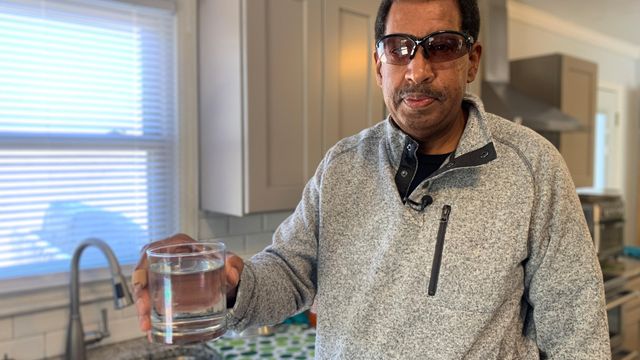After 35 years without tap water, some south Durham residents feel shut off by city
Dozens of Durham residents say they have been living for more than 35 years without being able to drink the water from their tap.
Posted — UpdatedDespite living in homes in the city, they are not on city water lines.
A vote from City Council last week will finally change that.
This situation is hard to process as many take for granted that they can go to the tap and drink water at any time. But for some in Durham, they haven't enjoyed that for decades.
For instance, Isaac Woods and his family spend hundreds of dollars a year buying bottled water. That's because they have no other choice.
Woods is one of about 35 people living on Ardmore Drive in south Durham, who, despite living in the city, don't have access to city water. They rely on private wells.
However, records that Woods shared with WRAL show that experts tested the water from the well and tap. The results? It's contaminated.
Woods claims the contamination is because of toxins in the soil.
"When you go to your tap water this Thanksgiving dinner and get water and an ice-cold drink from your refrigerator, think about the people on Ardmore Drive. We don’t have that privilege," Woods said.
At a meeting last week, city leaders voted unanimously to get the residents a city water line and pave the road.
"I think this is a moral issue," said councilman Mark-Anthony Middleton. "It is the epitome of equity."
The total cost to pave the street and add water is estimated to be around $2 million. The city will pay that initially, but then residents will ultimately have to pay them back.
Because the residents are willing to pay for this, it will move them four to five years up to the list. Woods feels that it's too little, too late.
Woods says he and other residents have spent years writing to the city and even national leaders.
And even now with a promise for change, they feel largely ignored. Woods feels it's a human rights issue.
"We have Blacks and Latinos living on this street here, blue collar workers," Woods said. "And I feel that is part of the reason we have not been heard over the decades."
As far as a timeline, the city told WRAL that it's a multi-tiered process that will take years. At the earliest, construction would start in 2024.
• Credits
Copyright 2024 by Capitol Broadcasting Company. All rights reserved. This material may not be published, broadcast, rewritten or redistributed.





